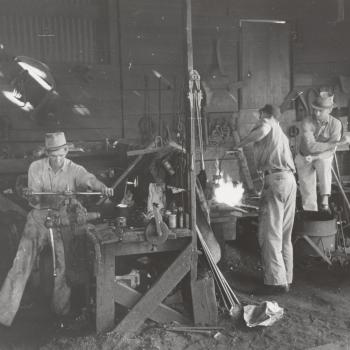Emile Durkheim (1858-1917), Max Weber (1864-1920) and other founders of the discipline of sociology were concerned about the negatives that accompany modernity. Why is it that people live closer together, yet in their proximity they are strangers? Why in the highly rational and efficient modern world do people struggle to find any meaning within their day? What happened to a world that was once teleological, infused with meaning, enchanting in the morning and delightful at sunset? Why with so much information at hand do people feel so alienated from their surroundings?
There are two worldviews. Religious shorthand can be used to name each. But the worldviews are not synonymous with a religion. The Protestant worldview dominates the modern project. It is associated with individual striving and rational efficiency. It smiles on the beneficent but frowns on the lazy. It is properly negative toward superstition and quite positive about statistics and research.
The Catholic worldview is older. It values community and personal intuitions. It is uncomfortable with extreme capitalism and overly large bureaucracies. It moves at a slower pace and favors plentiful meals. It is, in short, out of step with the latest way of doing things.
Each of these worldviews, please note, is not restricted to members of any particular religion. Many Catholics, including most in the United States, have adopted the modern Protestant worldview. Some Protestants are intrigued by the older Catholic worldview of community and enchantment. Some Catholics prefer the older Catholic worldview. Some people from no particular religious tradition have adopted the Protestant ethic; a few such people have explored the Catholic ethic.
Fr. Andrew Greeley (1928-2013) described the Catholic sacramental imagination in over 85 books of non-fiction and in over 65 novels. Those with a Catholic squint on things “find our houses and our world haunted by a sense that the objects, events and persons of daily life are revelations of grace,” he says in The Catholic Imagination (University of California, 2000). “The Catholic imagination in all its many manifestations…tends to emphasize the metaphorical nature of creation.” This is to say “that there is a propensity among Catholics to take the objects and events and persons of ordinary life as hints of what God is like.” Transcendent is lurking in the mundane.
Some young adults are in quiet rebellion against the promise of modern life. They are bored by our vacuous culture; weary of media overload. They are unfulfilled by their high-pressure jobs and have concerns about an economy based on part-time employment and lots of automation. They sense that too often their relationships are formulaic. They know that national leaders are forever answering questions no one is asking.
Here is what to do and not to do.
Don’t sample pieces from various traditions, particularly those associated with New Age movement. The pick-and-choose approach is almost always ephemeral. Be disciplined about the search for meaning. Epiphanies happen, but only as a by-product of sustained endeavor.
Don’t foolishly roll back the clock. Attempts to recreate a golden age are a waste. For starters, the golden age was not so hot; I was there.
Superstition is no help in finding meaning in daily life. Science and reason must be loyal companions to faith or spirituality or any relevant meaning system.
Individual endeavors are self-defeating because disillusionment is related to modernity’s neglect of community for the sake of individual primacy.
The endeavor must include companions, friends on the journey. Don’t walk alone even if the alternative means putting up with imperfect people.
One place to start a search for meaning is within the Catholic worldview. This is not the same as going to a Catholic church. Anyone is welcome to check out the older worldview. Start perhaps with reading and then discuss books or articles with friends. Go to films with a community setting or films about second chances. For a quick introduction into this worldview, look around for a nun. She will be volunteering at a food pantry, conducting a campaign against trafficking, visiting detainees in jail, assisting at a neighborhood clinic or staffing a homeless shelter. Walk with her. Can’t find a nun? Go to the nearest Catholic Worker house (www.catholicworker.org). There’s no preaching there. That is, no preaching with words. But there is service to immigrants and the poor. There is laughter. There is banter and discussion about the world as it is as compared to the world as it should be.
Droel edits INITIATIVES (PO Box 291102, Chicago, IL 60629), a newsletter about faith and work.










